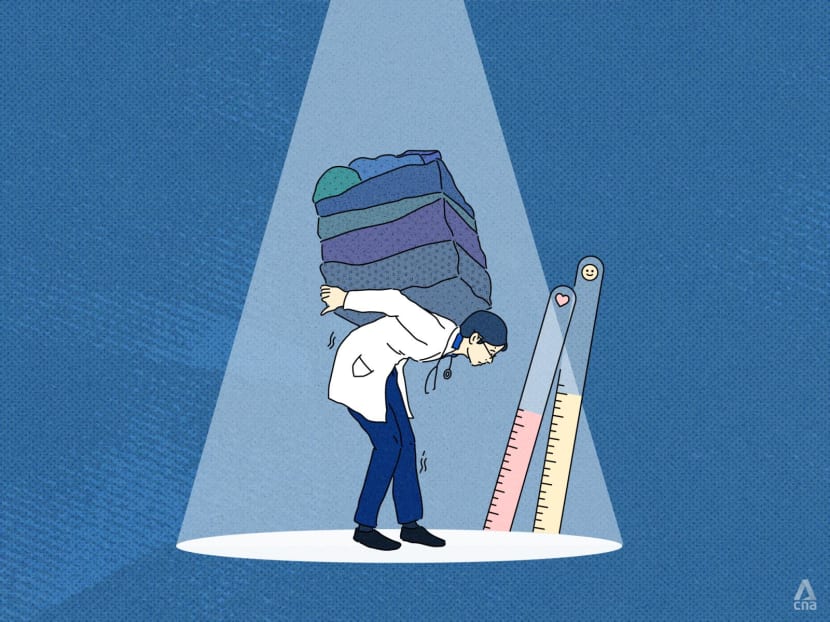Exposure to high stress at our jobs can harm us in the long run. How do we handle the pressure?
Health experts warned that the long-term effects of being in a high-pressure job can be devastating, reducing our ability to regulate emotions and make decisions, for instance.

Stress can affect a person's decision-making capability and memory in the long run, health experts said. (Illustration: CNA/ Samuel Woo)

This audio is generated by an AI tool.
One moment, he is in Singapore and the next, he is in another country helping to transport a patient across country borders.
In an aeroplane with limited resources, sick patients and worried family members thousands of metres above the ocean, stress is all too common for Dr Charles Johnson, an emergency medicine physician.
While he has since adapted to the pressure and irregular hours after becoming a doctor more than 30 years ago, the 56-year-old told CNA TODAY that it took him over a decade to get used to the high amount of stress associated with his job.
“When the patient is critically ill, we're working under time pressure with limited resources on the plane,” he said.
“You can't go to the nearest hospital because you're in a plane in the middle of the ocean ... and there are things you can't control like bad weather and turbulence. But I just trust myself that in the moment, I do the right thing and the best I can."
Although individuals such as Dr Johnson eventually find a way to function efficiently and more comfortably in such environments, health experts told CNA TODAY that constant exposure to high-stress environments can be harmful, leaving a lasting impact on mental health and decision-making capabilities.
LITTLE MARGIN FOR ERROR
High-pressure jobs often have tight timelines and place great pressure on people to do everything perfectly because mistakes can have dire consequences.
They may be those in the financial services who deal with clients who might give them pressure to perform, or those in the medical field or law enforcement officers who face life-or-death situations often.
People who work in other sectors may not face such high pressure situations on a regular basis but may be exposed to them on occasion.
Ms Sandhya Aswani, a mental health counsellor from social enterprise It All Starts Hear, said several factors contribute to a high-pressure work environment.
For instance, the nature of the job could be fast-paced with tight deadlines, or people are expected to deal with critical situations such as emergency response settings.
“Such environments can be physically and emotionally demanding, requiring you to make quick decisions on the go. These decisions often have high impact and lasting consequences,” she said.
Beyond that, such jobs may have little margin for error and employees may have high expectations placed on them.
“All of this is magnified in environments with little support or healthy avenues for employees to cope with stress,” Ms Sandhya said.
THE RISKS OF A HIGH-PRESSURE JOB
Dr Annabelle Chow, principal clinical psychologist at Annabelle Psychology, said that when people are placed in high-pressure situations, their brain kicks into survival mode by activating their sympathetic nervous system.
The sympathetic nervous system activates the fight-or-flight response when faced with a threat of perceived danger, by releasing adrenaline and cortisol, a stress hormone.
“Although natural stress hormones such as cortisol and adrenaline play useful roles in enhancing brain function and increasing blood glucose levels for immediate muscle action, these benefits are only short-term,” she said.
“Key functions such as decision making and emotional processing start to break down, making it harder to stay clear-headed.”
In the long run, Dr Chow warned that chronic stress can affect the brain, especially when it comes to memory, emotional regulation and decision making.
“Over time, it also increases the risk of neurodegenerative diseases such as Alzheimer’s and dementia,” she added.
“Essentially, prolonged stress causes the brain to function in ways that are non-optimal, making it harder for individuals to cope with and respond to situations appropriately.”
She noted that several studies have shown that chronic stress can reduce the size of the part of the human brain that makes learning and forming new memories difficult.
The amygdala, a part of the brain that regulates emotions, can become overactive as well, making people more prone to anxiety or mood swings.
For people holding high-pressure jobs where there can be life-or-death outcomes – such as doctors and firefighters – witnessing tragedies as a result of a mistake can also result in survivor’s guilt or post-traumatic stress disorder, she added.
MANAGE THE PRESSURE WITHOUT LEAVING THE JOB
Ultimately, people in high-stress jobs may not be able to escape the pressure entirely without giving up on their careers. However, the experts said there are practical ways to manage the stress.
Ms Vivien Tay, a senior counsellor at New Leaf, said it is essential to stay connected to the purpose that drives our work, and trust the judgments that we have learnt through years of training, education and experience.
“While it is natural to feel the weight of others’ expectations, staying grounded in your professional training and experience is key to making informed and sound decisions.”
She also said that having a supportive network of trusted professionals such as colleagues, mentors or supervisors can help refocus your thinking and assist when the weight of the decision feels overwhelming.
“Maintaining sound decision-making in high-pressure, life-and-death situations requires a balance of self-awareness, support and practical techniques to manage stress,” she added.
“By staying true to your professional training, embracing collaboration and recognising the uncertainty inherent in complex situations, you can navigate high-stakes situations with composure, clarity and confidence.”
Dr Chow warned against habits such as skipping meals or sacrificing sleep that negatively affect mental clarity in high-pressure jobs.
“While these may seem like quick solutions, they have significant consequences for mental clarity. The brain requires adequate fuel from food to function optimally and without regular meals, cognitive performance – including concentration, memory and decision making – suffers,” she said.
“To break free from these unproductive patterns, it is essential to replace them with healthier alternatives that prioritise self-care and well-being so that we can be productive in a more sustainable manner.”
She said that adopting relaxation techniques such as diaphragmatic breathing, which involves slow and deep breaths to help promote relaxation, can help reduce stress throughout he day.
When possible, taking short and regular breaks throughout the workday can help prevent mental fatigue, Dr Chow added.
It is also important to take care of yourself by staying hydrated and getting enough sleep each day.
“Mental clarity is influenced by a combination of physiological, emotional and cognitive factors,” she said.
“It is important to remember that change does not need to happen all at once. The key to long-lasting transformation is to start small. Choose one area where you feel most ready to improve. Perhaps it is committing to getting enough sleep or tackling tasks before they pile up.”
For Dr Johnson, adopting "lifestyle medicine" has helped him stay clear-headed and reduce his stress levels so that he is able to do his best at work while in "the right mind space".
Lifestyle medicine is a medical multidisciplinary specialty that looks at making healthy lifestyle interventions to prevent and reverse the root causes of health challenges such as obesity, diabetes, hypertension and more.
Dr Johnson said he has turned to a diet that avoids meats and ultra-processed food. He exercises often and tries his best to get enough restful sleep.
“It is these little things that help me stay healthy and clear-headed so I can handle work ... and reminding myself that I’ve tried my best and given my all whenever I’m (on call).”













